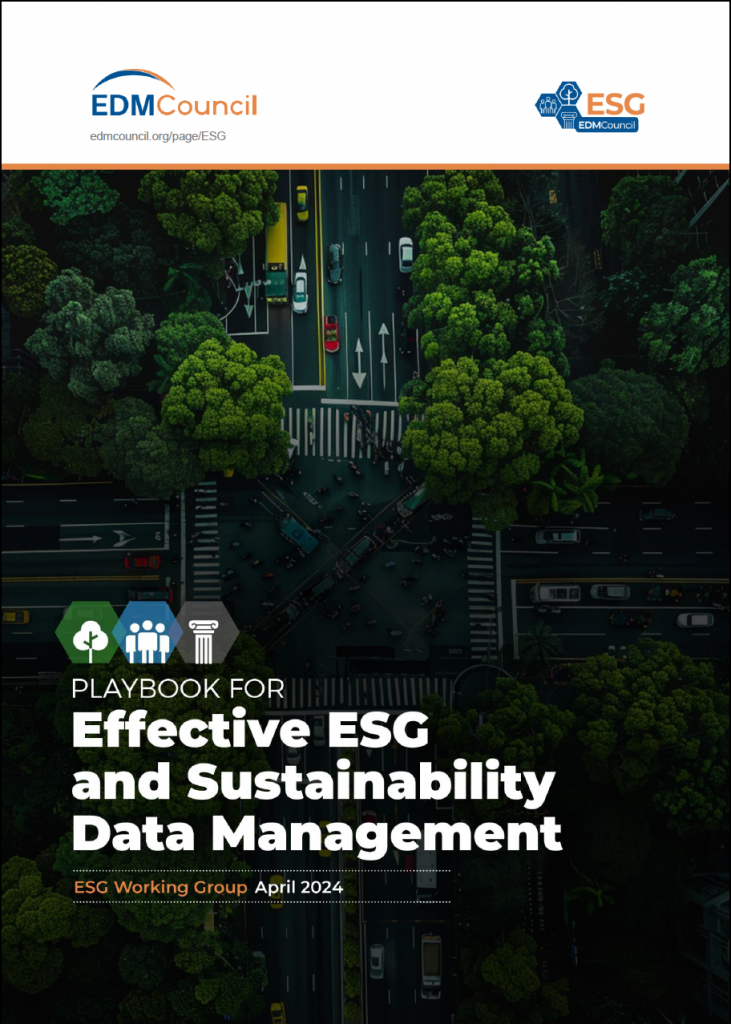
In today’s rapidly evolving corporate landscape, environmental, social, and governance (ESG) reporting has become a focal point for organizations aiming to demonstrate their commitment to sustainability and responsible business practices and comply with a growing roster of regulations. As companies navigate the complexities of ESG reporting, they increasingly seek guidance on how to effectively manage and disclose ESG-related information.
However, with the surge in demand for credible, externally assured ESG disclosures comes the challenge of effective data management. Fortunately, established industry standards offer valuable frameworks that can be leveraged to streamline ESG reporting processes and enhance data quality: the EDM Council’s DCAM data management best practices and the Committee of Sponsoring Organizations of the Treadway Commission (COSO) guidance for ICSR (see below).
Through the collaborative efforts of the EDM Council’s ESG Working Group, a practical “Playbook for Effective ESG and Sustainability Data Management” has been designed to guide companies in a direction where existing tools and known data management converge. “Companies certainly should not reinvent the wheel,” note the paper’s authors. “The good news is they do not need to start from scratch; the knowledge and tools to achieve quality ESG data and disclosures already exist and simply need to be brought to the rapidly emerging sustainability practices.”
Three years ago, an initial investigation by the EDM Council ESG Working Group, diving into the many ESG data challenges that arise for corporate reporting entities found 14 distinct challenges. By now mapping these challenges to industry-recognized frameworks, the Group hoped to outline a way forward for data professionals and report preparers.

Enhancing Internal Controls for Sustainability
Enter two stalwarts in the realm of corporate governance and data management: The first is the Committee of Sponsoring Organizations of the Treadway Commission (COSO)’s Achieving Effective Internal Control Over Sustainability Reporting (ICSR) publication on how the COSO “Internal Control — Integrated Framework (ICIF)” applies to sustainable business activities and information. The second is the EDM Council’s Data Management Capability Assessment Model (DCAM) defining best practices in data management and advanced analytics. These frameworks, while initially designed for different purposes, converge to offer a robust outline for organizations seeking to navigate the complexities of ESG reporting.
The COSO “Internal Control — Integrated Framework” has been a cornerstone of internal control practices since its inception in 1992. Originally focusing on enterprise risk management, internal control, and fraud deterrence, the framework’s scope expanded in 2013 as ICIF-2013 to encompass all aspects of corporate reporting, including financial and non-financial aspects. Aligned with regulations such as Sarbanes-Oxley (SOX), the framework provides a foundation for internal controls in corporate reporting activities worldwide.
The March 2023 release of COSO’s supplemental guidance, “Achieving Effective Internal Control over Sustainability Reporting (ICSR),” further extended the ICIF’s applicability to sustainable business activities and information. By integrating the five components of the COSO framework — Control Environment, Risk Assessment, Control Activities, Information and Communication, and Monitoring Activities — ICIF provides guidance on managing ESG-related risks and enhancing the quality of sustainability disclosures.
Another influential framework, EDM Council’s DCAM, offers comprehensive guidance on establishing and sustaining effective data management initiatives within organizations. Developed based on practical experiences and lessons learned by leading organizations, DCAM addresses key components such as data strategy, governance, quality management, and analytics.
Convergence and Collaboration: Bridging the Gap
The combination of COSO’s ICSR framework and DCAM presents a powerful platform for addressing the challenges of ESG data management and reporting. By leveraging established industry standards, companies can accelerate the adoption of best practices and enhance the reliability of their ESG disclosures. This approach not only aligns with existing practices in financial reporting but also facilitates the necessary collaboration across departments involved in collecting, curating, and reporting ESG information.
With this in mind, the “Playbook for Effective ESG and Sustainability Data Management” addresses how to approach the 14 key ESG data challenges for corporate reporting entities — from identification of data sources to external assurance of ESG reporting data — by cross-referencing and mapping them against the two frameworks. For each challenge, key action items are provided.
The Playbook presents in greater detail how best to leverage the existing knowledge and tools within an organization to achieve quality ESG data and disclosures. It also assists in mapping a clear direction for companies to follow as they look to apply their recommendations. By applying the principles of COSO’s ICIF framework for ICSR and the EDM Council’s DCAM, companies can bridge the gap between traditional financial reporting and emerging sustainability practices. Rather than reinventing the wheel, companies can harness the synergies between the COSO framework and the DCAM framework to accelerate their sustainability journey. Furthermore, this approach highlights the interconnectedness of data management and ESG reporting, emphasizing the need for a holistic strategy to ensure data integrity and reliability.
Addressing specific challenges identified in ESG data management, such as data materiality, accountability, ownership, quality, and reporting requirements, the Playbook provides actionable recommendations for organizations to enhance their ESG reporting practices. From establishing governance models to defining data ownership and quality management processes, each recommendation is tailored to address the unique needs of ESG reporting.
Empowering Sustainable Futures
In an era where the only constant is change and the corporate sustainability reporting landscape continues to evolve, the need for trusted data and robust reporting mechanisms remains paramount. The adoption of established industry standards such as COSO’s ICIF framework for ICSR and EDM Council’s DCAM offers a pragmatic, unified and data-driven approach to accelerating ESG reporting efforts. Organizations can then not only meet regulatory requirements, but also unlock new opportunities for sustainable growth and value creation. As we continue to chart the course towards a more sustainable future and better social and corporate governance, the power of effective ESG data management will serve as a catalyst for positive change, driving innovation, transparency, and accountability across industries and sectors.
For more information
- Download the “Playbook for Effective ESG and Sustainability Data Management”
- Learn more about the EDM Council’s ESG Data Working Group. The Council also invites industry participation in the Group.
- Learn more about COSO and the “Internal Control – Integrated Framework (ICIF),” including the guidance for organizations for Achieving Effective Internal Control Over Sustainability Reporting (ICSR).
This quarter’s column contributed by leading members of the EDM Council’s ESG Data Working Group:
- Edward Morgan, Director, Financial Services Consulting, AI & Data, EY
- John Muntges, Senior Manager, Product Management, EDM Council
- Marie-Josée Privyk, ESG Advisor, FinComm Services
- John Truzzolino, Director Corporate Governance and Compliance Solutions, Global Capital Markets, DFIN
- Stuart Wallace, Director, Financial Services Consulting, AI & Data, EY
- David Wray, ESG Chair, International CFO Alliance and President, DFCG International Group
